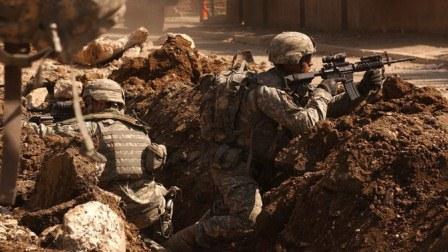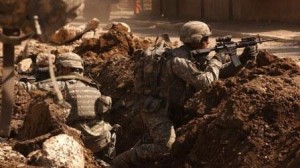Latest News
Wars in Iraq, Afghanistan Have Cost US Almost $5 Trillion

 Almost 7,000 U.S. troops have been killed since the conflicts in Afghanistan and Iraq began, and about 210,000 civilians in those two countries and Pakistan have lost their lives as a result of the fighting, according to Brown University’s Watson Institute. In addition, nearly 7,000 contractors working for the U.S. and its allies have died. In all, roughly 370,000 people have died as a direct result of the fighting.
Almost 7,000 U.S. troops have been killed since the conflicts in Afghanistan and Iraq began, and about 210,000 civilians in those two countries and Pakistan have lost their lives as a result of the fighting, according to Brown University’s Watson Institute. In addition, nearly 7,000 contractors working for the U.S. and its allies have died. In all, roughly 370,000 people have died as a direct result of the fighting.
The number of dead does not include the maimed, the wounded and the soldiers suffering from the psychological aftermath with post-traumatic stress disorder.
In a new update on the devastating economic cost, the Watson Institute’s Costs of War Project says the U.S. has spent or is on the hook for $4.8 trillion and could wind up paying out almost $8 trillion when the final accounting is done.
The $4.8 trillion includes “direct congressional war appropriations; war-related increases to the Pentagon base budget; veterans care and disability; increases in the homeland security budget; interest payments on direct war borrowing; foreign assistance spending; and estimated future obligations for veterans’ care.
“This total omits many other expenses, such as the macroeconomic costs to the US economy; the opportunity costs of not investing war dollars in alternative sectors; future interest on war borrowing; and local government and private war costs,” the institute says.
Because the wars have been funded “almost entirely by borrowing,” the institute says, America’s budget deficit and national debt have increased, which in turn pushes up consumer interest rates.
“Unless the U.S. immediately repays the money borrowed for war, there will also be future interest payments,” the institute says. “We estimate that interest payments could total over $7.9 trillion by 2053.”

Latest News
Afghanistan’s problems caused more damage to Pakistan than 3 wars with India: Durrani

Islamabad’s special envoy for Afghanistan Asif Durrani said on Wednesday that Pakistan has suffered more due to Afghanistan’s internal situation than Pakistan has suffered in three wars with India in terms of blood spilt and finances drained.
Durrani said at a one-day International Conference titled “Pakistan in the Emerging Geopolitical Landscape”, which was organized by the Institute of Strategic Studies Islamabad (ISSI) and the German Friedrich Ebert Stiftung (FES), that over 80,000 Pakistanis died in the two decades of the War on Terror and that his country was still counting its dead and injured.
“After the withdrawal of NATO forces, it was hoped that peace in Afghanistan would bring peace to the region. However, such expectations were short-lived,” he said.
He also stated that attacks by the Tehreek-e-Taliban Pakistan (TTP) militant group on Pakistan’s border areas increased by 65 percent, while suicide attacks increased by 500 percent.
“The TTP’s enhanced attacks on Pakistan while using Afghan soil have been a serious concern for Pakistan. Another worrying aspect is the participation of Afghan nationals in these attacks,” he said.
Durrani also said Pakistan had suffered geopolitically since the Soviet Union invaded the neighboring country.
“The post-9/11 world order has negatively impacted Pakistan. Apart from losing 80,000 citizens’ lives, including 8,000 law enforcement agency personnel, the country’s economic opportunity cost is estimated at $150 billion,” Durrani said.
Talking about the future outlook for Pakistan in the regional context, Durrani said that while “our eastern neighbor is likely to continue with its anti-Pakistan pursuits, the western border poses an avoidable irritant in the short to medium term.”
However, he said Pakistan can overcome its difficulties with Afghanistan, including the TTP challenge.
Latest News
Afghanistan now a ‘nexus for diplomatic endeavors’, says IEA

In the wake of dozens of meetings between high-ranking Islamic Emirate officials and visiting officials from foreign countries, and other diplomatic advances, the IEA said on Thursday that in the current geopolitical landscape, Kabul now “serves as a nexus for diplomatic endeavors and political deliberations pertaining to global affairs”.
In a series of posts on X, the IEA’s spokesman Zabihullah Mujahid said diplomatic missions and political delegations from various nations, including Russia, Malaysia, Kazakhstan, Turkmenistan, the European Union, and others, “are evident in the capital, highlighting its strategic importance in fostering Islamic cooperation”.
He said: “Recently, the honorable Minister of Transport of the Islamic Emirate, Mr. Hamidullah Akhundzada, led a significant delegation to Termez, Uzbekistan, for essential discussions aimed at enhancing bilateral relations.
“These discussions encompass a wide range of topics, from trade facilitation to security assurances, indicating a focused effort by the Islamic Emirate to strengthen and broaden its international engagements, thereby ensuring sustained development and stability.
“These initiatives, characterized by diligence and effectiveness, underscore Afghanistan’s enduring commitment to diplomatic engagement and its pivotal role in regional and global affairs,” he said.
Mujahid added that these initiatives “also emphasize the vital connection between diplomatic efforts and economic prosperity, promising favorable outcomes for Afghanistan’s socio-economic landscape.”
He pointed out that despite ongoing challenges, Afghanistan “remains steadfast in its pursuit of prosperity and resilience, defying pessimistic projections and charting a course towards political and economic renewal.”
He said: “Continued efforts are essential to fostering inclusive growth and impactful initiatives, thus advancing Afghanistan’s journey towards sustainable development and increased influence on the global stage.”
Latest News
Mullah Baradar discusses creation of railway with Kazakh deputy PM

Mullah Abdul Ghani Baradar, deputy prime minister for economic affairs has met with Erik Zhumangarin, the Deputy Prime Minister of Kazakhstan, and discussed the establishment of a railway network from Kazakhstan to Pakistan through Turkmenistan and Afghanistan, the deputy PM’s office said in a statement.
During the meeting, Baradar emphasized the need to sign agreements to solve the banking problems of traders from both countries, the creation of Afghan-Kazakh joint companies, and the facilitation of visas for Afghan traders.
According to the statement, the Deputy Prime Minister of Kazakhstan said that the Kazakh government intends to establish a joint chamber of industry and commerce and a joint trade and labor group between the two countries, and is ready to cooperate with Afghanistan in the sectors of e-governance, industry, higher education, education, health, and banking.
-

 Sport5 days ago
Sport5 days agoAfghanistan Champions League kicks off with grand opening ceremony
-

 Latest News4 days ago
Latest News4 days agoPakistan’s frontiers minister stresses ‘dignified’ return of Afghan refugees
-

 Latest News5 days ago
Latest News5 days agoMore than 800 Afghan refugees deported from Pakistan in two days
-

 Regional3 days ago
Regional3 days agoIranian president lands in Pakistan for three-day visit to mend ties
-

 Climate Change4 days ago
Climate Change4 days agoMassive river flooding expected in China, threatening millions
-

 Latest News4 days ago
Latest News4 days agoChinese keen to invest in Panjshir-Kabul water conduit project
-

 World4 days ago
World4 days agoTwo Japan navy helicopters crash, one body found, 7 missing
-

 Latest News2 days ago
Latest News2 days agoRashid Khan named AWCC’s brand ambassador
















